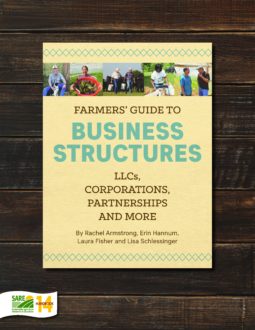A business entity is the legal structure or form that outlines the legal parameters of a business operation. Many business entity options exist, including the C corporation, the LLC, the B corporation, the cooperative and the nonprofit. There’s also an entity known as the S corporation, which actually is a federal tax status that can be applied to a C corporation, the LLC or the B corporation. We’ll call all of these the “formal entities.”
In comparison, we have “default entities.” These include the sole proprietorship, the general partnership and the unincorporated nonprofit association. Default entities are still subject to laws that define business operations that have not formally created an entity. For example, if a farmer is selling crops or livestock, they’ll be considered a sole proprietorship if they haven’t taken any other steps to define the business. If two friends come together to sell a product or service, they will be recognized by the law as a general partnership–even if they don’t file any paperwork.
Every business entity, including the default sole proprietorship and general partnership, carries legal implications. These implications help define tax treatment and answer the questions of who has which rights and privileges, who has the authority to make decisions, when and how owners take a draw on profits, and who’s liable for which decisions and actions. Taxation, rights and privileges, and liability are three driving forces for many farmers in choosing an entity. The purpose or objective of the farm operation may also come into play. Is the farm driven primarily by making profits, or do social or environmental causes play just as much of a guiding role? Succession planning is also key to consider when choosing an entity.
A formal business entity is considered a person in the eyes of the law
Before the corporation was created, people could only do business under their own personal name. At the same time, they took on the risk of personal liability for any acts or financial issues associated with the business. The ability for people to create corporations changed that. Fundamentally, corporate laws allow people to create an entity separate from themselves that can do business on its own, under its own name. The business entity in effect is classified as a “legal person” in the eyes of the law.
This means that, like people, the business entity has rights and duties. Its rights include the ability to enter contracts, possess property, and sue and defend itself—all in the name of the entity. Just like a person, the business entity can lose all its money and file for bankruptcy in its own name. The business entity can also be sued for wrongdoings and illegal action taken by the owners on behalf of the corporation.
The business entity effectively stands in for the people behind it. But,
these benefits extend if, and only if, the courts agree that the owners were upholding certain standards. Otherwise, the corporate shield can be knocked down and the owners’ mismanagement or wrongdoings will put them at risk personally. This is called “piercing the corporate veil” in corporate law speak. The takeaway is that a business entity is considered another person that can absorb and protect the owners from personal liability, unless the owners begin exploiting the rights of the entity. If this happens, the reality is that the entity is simply just a shell or a veil over the owners themselves.
How is a business entity governed?
State statutes control the way each business entity is created and governed, including the default sole proprietorship and general partnership. When it comes to business decisions and actions, the business entity itself can define its own rules through organizing documents such as the bylaws, a partnership agreement or an operating agreement. The business’s own rules will prevail as long as the rules are in line with the baseline requirements of the state statute. Accordingly, each business entity may have a different baseline in terms of the rights, privileges or responsibilities for the business and its owners. Choosing the entity that matches the farm operation owners’ goals can help bring everything into alignment.
Do I have to choose an entity?
Technically, a farm operation does not have to officially choose an entity. Farmers can certainly start selling their products without officially creating an entity. Of course, certain licenses and registrations may need to be obtained, but that can be done in the name of the owner(s) personally. If a farmer does nothing more, the farm operation will effectively be treated as a default entity–a sole proprietorship if one owner, a general partnership if multiple owners. (Although unlikely, an unincorporated nonprofit may be the default if the primary purpose of the farm operation is a nonprofit, social cause.)
Choosing not to form a formal entity is not necessarily a bad or wrong option. It takes time, money and willingness to follow certain formalities. Farmers unwilling to provide these resources might be better off managing risks in other ways.
Regardless of the ultimate decision, it can be helpful to go through a deliberate decision-making process of fully reviewing and understanding the pros, cons, benefits and risks of officially forming a formal entity or decisively electing to be a default entity. Occasionally, a bank, financial institutions or a regulatory agency may urge a farm operation to become one or another formal entity. It’s good to get the facts up front and to make a conscious decision based on your unique farm operation.
